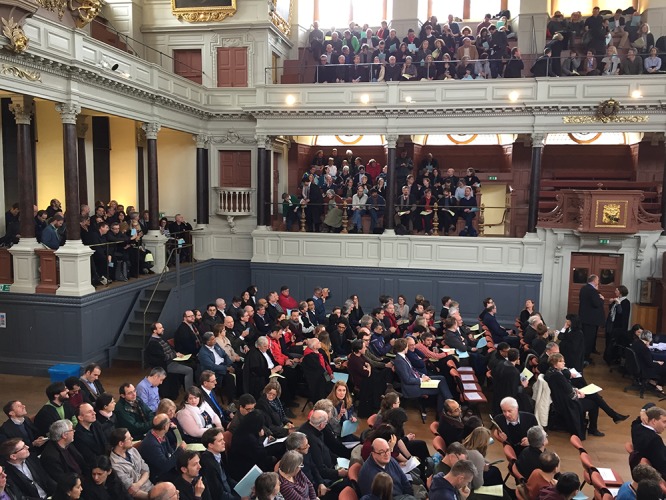The United Kingdom is not known for its revolutions—we have no 1776, nor a 1789, so it is possible to get the sense that UK society rarely challenges the status quo, or says “No” to imposed solutions; but that is not always the case. There are bits of history, some quiet,1 some not,2 that demonstrate UK society is quite capable of rising up, and one of those occurred earlier this year.
As demographics change, pension resources are being reconsidered, globally; the funds that support those held by many academics in the UK are no exception. The scheme that administers these pensions is fairly unique, with a joint liability across many of the universities to maintain mutual duties to all pensioners. This intriguing mechanism provides interdependent security, but also means that the leaders of UK universities must together try to guide the fund by balancing risks with duties. After several years of “adjustments” to the scheme (invariably resulting in an erosion of pensions), an adjustment proposed last year proved a step too far for many academics, and as a result the academics’ trade union (the UCU) called a ballot for industrial action, known in the UK as a “strike”. UK law requires a certain majority of votes from a minimal proportion of union members in order for such strikes to be legal; the response from academics was overwhelmingly in favor.
Regardless of the rights or wrongs, the strike created fierce debates that were in part about the future finances of members of the picket line, but interestingly, perhaps more about the very nature of academic and student life in the UK. It was about how our universities are now run (and to what ends), and about supporting future generations of academics in the country. Set against this were the responses of our university leaders: since previous adjustments had been approved by all universities and their leaders in 2017, it was anticipated that this view would simply be reiterated. Instead, however, Vice Chancellors around the country one by one voiced doubts; some even backed the strikes. A debate emerged.
All this led to some extraordinary scenes, many of which were surprisingly little reported. One of the most extraordinary took place in Oxford on March 6, 2018. The University of Oxford is governed by an academic “parliament” called Congregation, which has the power to propose and vote on how the university is run. Meetings of Congregation—which are held in the Sheldonian Theatre, an imposing and rather dramatic circular wood-beamed hall, designed by Christopher Wren—are subject to long-standing regulations as to how motions may be proposed, including how much notice is needed. At the early March meeting, a motion had been put to Congregation to debate the pensions issue, and the University’s response—but with less than the required notice period.
At 2 pm the meeting began, attended by around 500 academics, many in their academic gowns, and the vast majority against the proposed pension reform. Through a rarely seen process, 21 people stood up to object on the basis of the insufficient notice period,3 and the debate inside the Sheldonian was prevented. With the official debate thus thwarted, the proposers of the debate then rather passionately invoked a bylaw that enabled the debate to continue outside the theatre—which is exactly what happened.
Most inside the hall then trooped outside into the surrounding courtyard, and by a margin of 482 to 2 voted to ask the University to change its position. By 8 am the following morning, the Vice-Chancellor had confirmed that the University of Oxford’s Council would indeed be reversing its stance. This reversal was just one among several others at the university administration level that, coupled with the strike, led to the eventual cancellation of the pension adjustment decision, and re-engagement with the academic union.

UK academicians gather inside Sheldonian Theatre in Oxford to discuss a proposed pension reform on March 6, 2018. Credit: E. Anderson.
For those of us who witnessed and took part in these events of strike and debate, and even academics in gowns gently “facing down” their leadership, this was a genuinely heartening process. Rather than these being debates about self-interest or simply money (although the conflict of interest should be noted), it was inspiring to see the thing that drives so many academics remains their sense of purpose—the questions of what universities are for, what they should do, and how they should be run in order to pass down this ethos to future generations of students, researchers, and teachers.
Views expressed in this editorial are those of the authors and not necessarily the views of the ACS.
References
- Manifest der Kommunistischen Partei; Workers’ Educational Association (Communistischer Arbeiterbildungsverein): London, 1848. [Google Scholar]
- Cromwell O.; Carlyle T.; Oliver Cromwell’s Letters and Speeches, with Elucidations; Chapman and Hall: London, 1845. [Google Scholar]
- “Since the Resolution to Suspend Statutory Procedure has been proposed giving less than 19 days’ notice, it shall not be moved if 20 or more Members ‘signify their objection by rising in their places after the resolution has been read by the Registrar.’” (Congregation Regulations 2 of 2002, 3.6(2)).


